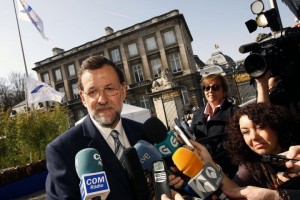
“I know about economics. I’m not an economist but I know about economics and I have aides whom I consult.”
This comment, made during a recent television interview, is not very reassuring coming from a man who aspires to become Spain’s prime minister in the near future. But then Mariano Rajoy is rarely unequivocal in his handling of the conservative Popular Party (PP) he leads.
According to many, his reluctance to be clear-cut and firm is typical of the ambiguous Galician character. One obvious example is Rajoy’s management of the ongoing corruption scandal rocking his party. The lack of a clear policy on this has meant that some PP politicians facing investigation for the Gürtel kickbacks scandal have stepped down, while others, such as Valencia regional premier Francisco Camps, have the party’s backing.
The main reason Camps remains in his post is that he is seen as a certain winner in next spring’s regional elections. And with nationwide local elections approaching, as well as those in Catalonia this autumn and even the possibility of an early general election in the next few months, Rajoy appears to be warming up for the campaign already.
Perhaps the clearest evidence that the camera-shy PP leader is reaching out to voters was his appearance as a commentator on state broadcaster RTVE’s television coverage of the Vuelta a España cycling race earlier this month. Rajoy, who is a genuine cycling fan, can look tense or unnerved in public, but he came across as surprisingly relaxed in his stint in front of the microphone.
And yet, he has plenty of work to do to convince Spaniards that he would make a good national leader. Prime Minister José Luis Rodríguez Zapatero’s approval rating has been slashed by his handling of the economy and yet he still enjoys better figures than Rajoy, whom he beat in the 2004 and 2008 elections.
A recent El País poll showed that while the PP enjoys a nine-point lead over the governing Socialists, Rajoy’s 21-point approval rating trails Zapatero’s 31 points. To use a cycling analogy, Rajoy’s team is dominating the péloton, yet he isn’t wearing the leader’s jersey.
Nostalgia for Rato
Thus the desperation to underline his economic credentials and his insistence that “I know about economics.” Since the recession hit Spain, Rajoy’s strategy has been to sit back and let Zapatero dig himself a hole, without taking the risk of offering much in the way of solid alternatives, other than a preference for spending cuts over tax rises. The party’s senior hierarchy met in Toledo at the end of the summer to discuss 50 economic measures to present over the coming months. So far we don’t know if these are serious proposals or simply further political broadsides aimed at Zapatero.
How the Popular Party must now be ruing its 2003 decision (taken virtually single-handedly by José María Aznar) to make Rajoy party leader rather than the internationally recognised, economic heavyweight Rodrigo Rato. Former IMF head Rato would surely have roasted the Socialists over their handling of the crisis while preparing a credible plan for government.
Rajoy, meanwhile, keeps us guessing as to who would make up his economic team. None of the senior party figures close to the leader have a background in economics. PP economic affairs spokesman Cristóbal Montoro might be an obvious choice for economy minister, but he is excluded from the inner circle. A former secretary of state for economy and president of Lehman Brothers in Spain and Portugal, Luis de Guindos, is reported to have Rajoy’s ear, as does BBVA chairman Francisco González.
A genuine trump card for the ministerial post would be Rato himself, currently heading up Caja Madrid savings bank, although the former economy minister appears to have ruled himself out of front-line politics.
Recent economic data suggests that, like many other countries, Spain’s second-quarter growth will be followed by a slowdown (a contraction of 0.1 percent on the previous quarter, according to the European Commission). Rajoy knows that the economy will almost certainly be the battleground for the next election, so presenting himself as a man able to manage it is perhaps his biggest challenge right now.
Well, Rajoy might seem a little tense at times, but beside Mr. Bean, he is a breath of fresh air. Rarely does one find a mistake or outright lie flowing from his lips, while with ZP it is the norm. His ability to distort the truth is so common, it is the butt of many jokes. Take the unemployment figures as one example, he requires the unemployed that want to benefit from the 400 Euros unemployment benny to enroll in a training course, then turns around and says that those in training are not actually unemployed, they are working for Spain. (Re: the Oslo conference.) Then not too long ago he said the land does not belong to anyone but the wind! His side kick, Ms. de la Vega, the first VP (he has three!) said the monies spent by the government do not belong to anyone! And it goes on and on. He is Spain's worst nightmare come to life!
American Expat,
Saying that Rajoy is a breath of fresh air is a bit too much. Rajoy lost two democratic elections against ZP already. The reason why no lie comes out of his lips is because he just doesnt talk. Period. Does he say anything about the massive corruption scandal going on in his party? nope, although he lets Ms. Cospedal say absurdities such as that Spain is a policial state…ejem ejem…. A lot of people agree with the fact that ZP couldnt be worse…but saying that Rajoy is a breath of fresh air…wow.. He´s considered worse than ZP by 84% of the spanish population. If ZP is in power there is only one to blame: RAjoy.